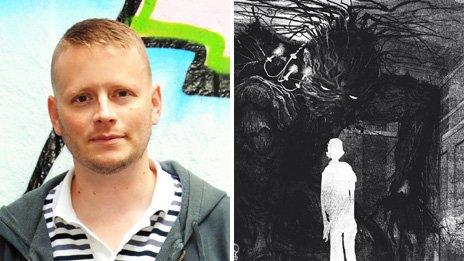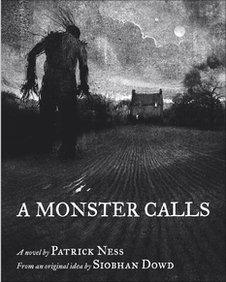Carnegie Medal: Patrick Ness book A Monster Calls scoops double honours
- Published

Patrick Ness based A Monster Calls on an idea by the late author Siobhan Dowd
Patrick Ness's novel A Monster Calls has won both the prestigious Carnegie Medal and its sister prize for illustration for the first time in the awards' history.
A Monster Calls tells the story of a boy coming to terms with his mother's battle against cancer.
It is the second consecutive Carnegie win for Ness, whose Monsters of Men took the prize in 2011.
Ness described the win as "extremely humbling - and a little unnerving".
For the first time, the same book won the Kate Greenaway Medal for book illustration, with Jim Kay picking up the prize at a ceremony at the Barbican in London on Thursday.
The Carnegie and Kate Greenaway Medals are awarded annually to a book for young people by Cilip: the Chartered Institute of Library and Information Professionals.
A Monster Calls was based on an idea by author Siobhan Dowd, whose death from cancer in 2007 prevented her from writing it herself. It was published by Walker Books in May last year.
Dowd herself won a Carnegie medal posthumously in 2009 for Bog Child. Dowd and Ness never met, although they shared the same literary editor.
"This win means people will have a reason to keep talking about Siobhan, and a reason to keep reading her books, and that's the best outcome that I could have hoped for," Ness told the BBC.

A Monster Calls was published in May 2011
Rachel Levy, chair of the Carnegie judges, described A Monster Calls as "an exquisite piece of writing".
She said: "One of our judges - bereaved at a young age - said she wished that she'd had A Monster Calls to read then, because while it describes the nature of grief with an extraordinary clarity it also fills the reader with a spirit of hopefulness and a love for life that is profound and lasting.
"We'd go so far as to say that this is one of the defining books of its generation."
The "monster" that calls on 13-year-old boy Conor is an ancient walking, talking yew tree.
Kay's stark illustrations portray the monster as a nightmarish giant with roots and branches sprouting from its head and limbs.
"Using only shades of black, white, and grey, Kay conjures immense symbolism, atmosphere and emotion to beautifully complement Patrick Ness' haunting text," said Rachel Levy.
Jim Kay told the BBC: "I still can't quite get my head around winning. It felt a little unreal to be on the shortlist alongside Dave McKean, who is an idol of mine."
A Monster Calls was Kay's second children's book commission. The Northamptonshire-based artist said his previous jobs in the archives at the Tate Gallery and the Royal Botanic Gardens at Kew had heavily influenced his art.
"Prior to this commission I'd been working on drawings of ancient trees in Richmond Park, so it felt like manna from heaven that this commission landed in my lap."
A Monster Calls has already won the children's book of the year award at the Galaxy National Book Awards and the Red House Children's Book Award 2012.
The second consecutive Carnegie win by Patrick Ness has only been achieved once before, in 1979-80 by Peter Dickinson.
US-born Ness said: "I had some early reaction from adults who thought it was too sad for for kids. I've always disagreed - I think kids are far more aware and open to these things than we give them credit for."
He said he had met hundreds of young readers from Carnegie <link> <caption>Shadowing Groups</caption> <url href="http://www.carnegiegreenaway.org.uk/shadowingsite/index.php" platform="highweb"/> </link> who were "not afraid to give their opinions".
"Teenagers are only ever discussed negatively," said Ness, "in terms what they can't do or what they aren't reading. There are 13,000 reviews on the Carnegie shadowing site, but it doesn't get coverage because it's a positive thing."
Ness has lived in the UK since 1999. Born on an army base in Virginia, he spent his early years in Hawaii, before moving with his family to Washington state when he was six.
The Carnegie prize was founded in 1937 in memory of Scottish-born philanthropist Andrew Carnegie and was first awarded to Swallows And Amazons author Arthur Ransome for Pigeon Post.
Other previous winners include Philip Pullman, Anne Fine, Terry Pratchett and CS Lewis.
- Published18 February 2012
- Published6 August 2011
- Published23 June 2011